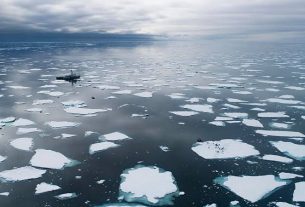Scientists in Scotland have recently autopsied a sperm whale that has washed up on a beach. He had 100 kilos of garbage in his stomach.
On November 30, members of the Scottish Marine Animal Strandings Scheme (SMASS) opened the belly of a sperm whale. The young mammal had come aground two days earlier on the beach at Luskentyre, Scotland. Inside his stomach, they discovered the reasons for his death: a compact ball of waste weighing at least 100 kilos. Mainly fishing nets, ropes, and plastic debris.
Initial analyses also suggested that the animal appeared healthy. In other words, he did not suffer from any disease or undernutrition. For researchers, it is indeed this huge ball of waste that is the origin of his death. It probably clogged the animal’s digestive system, which resulted in infection of the abdomen (peritonitis) and death.
Not the first example of its kind
Last April, a pregnant sperm whale was also found dead, stranded on a beach in Sardinia with 22 kilograms of plastic in her stomach.
In November 2018, about six kilos of plastic were also found in the stomach of a sperm whale stranded in Indonesia. Among the garbage had been discovered about a hundred cups and plastic bags, a nylon bag, and even two flip flops. The last example in April 2018, with a sperm whale (still), found dead on a beach in Cabo de Palos, Spain, with 29 kg of plastic in the digestive tract.
Recall that sperm whales (Physeter microcephalus) are the largest living species of toothed whales. These giants of the sea, which can reach 18 meters long and weigh up to 45 tons, feed mainly on squids and octopus in deep water. But given the state of our oceans, it seems that plastic is now also on the menu.
Remember that according to the association Theseacleaners, it is estimated today that eight million tons of plastic penetrates the oceans of the world every year, infiltrating the entire food chain.
We also learn that 90% of the plastic dumped in the oceans comes from 11 rivers and their tributaries from Asia, Africa, and South America. Among them, the Yangtze, the Mekong, the Amazon, the Yellow River or the Nile.

Email: ben@satprwire.com Phone: +44 20 4732 1985
Ben has been listening to the technology news for quite some time that he needs just a single read to get an idea surrounding the topic. Ben is our go-to choice for in-depth reviews as well as the normal articles we cover on a normal basis.



